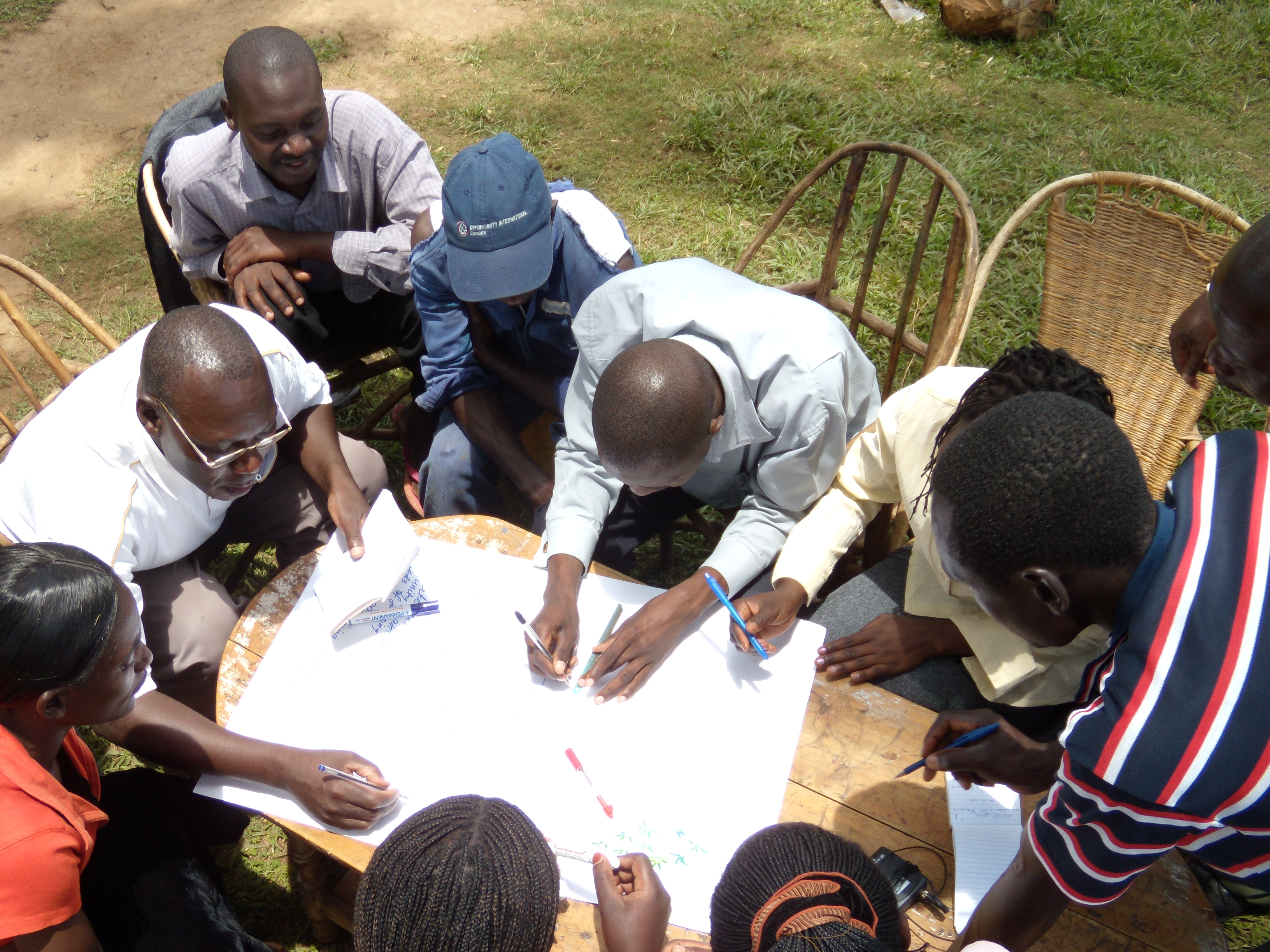DATABASE
Clean Efficient Biomass Cooking Stoves that Make Biochar and Fertilizer Out of Water Hyacinth Fuel Briquettes
ongoing
Country
Kenya
Budget
0 - 500.000 $
Year
2014
Issue
Solutions
Link
www.airterra.ca
Abstract
The African Christians Organization Network (ACON, est. 2000) is focused on reducing deforestation, improving cooking stove efficiency, and improving soils for farmers. Biochar producing clean efficient cooking stoves answer all three of these efforts. ACON makes and sells biochar stoves, water hyacinth fuel briquettes, and organic fertilizer.
Project Description
The African Christians Organization Network (ACON) has been working in Western Kenya since 2000 to empower villagers by providing opportunities for development that are environmentally sustainable. Since 2004, ACON has been focusing their work on how to reduce deforestation while improving soils for local farmers in the area. Part of this solution is the introduction of clean efficient biomass cooking stoves that generate biochar as a byproduct — a charcoal meant to be added to soils which can improve soil nutrient retention and water holding capacity as well as sequester atmospheric carbon. The Bungoma district of Western Kenya is 30 miles from the Uganda border and near a national forest as well as Lake Victoria. Villagers living in the area are mainly farmers who rely on annual rains for all irrigation making water crucial during the dry season. Families generally use a traditional 3 stone open fire for cooking, requiring a great deal of firewood and creating smoke. When Salim Mayeki Shaban, President and founder of ACON, started investigating fuel use in Bungoma, he found that the population was getting its firewood from primary forests and at the same time burning agricultural waste in the fields. The high fuel demand was quickly deforesting the area and some villagers had been taking wood illegally from the national forest. To alleviate the pressure on the forest, ACON designed a project that worked with local villagers to promote energy conservation and reduce deforestation through the use of improved cooking stoves.
BENEFICIARIES
The benefits of this project are multiple: 1. Manufacture and sales of clean efficient cooking stoves - generating employment and revenue. 2. Reduction of forest wood use for cooking 3. Reduction of indoor air pollution that causes respiratory illness 4. Use of water hyacinth, in invasive species on Lake Victoria and other water ways, as a fuel for the stoves 5. Production of biochar from the stoves acts as an enhancing agent in composts that work as a powerful fertilizer for ACON's farmers 6. Sequesters atmospheric carbon for long term as increased organic carbon content in soils 7. Generates revenue for rural households involved in making stoves, water hyacinth fuel briquettes, and highly desirable fertilizers.
Results
Since 2011, 10,000 efficient cooking stoves have been manufactured and sold in the local area around Bungoma, Kenya. This has resulted in significant revenue for the stove manufactures. Moreover there has been a reduction in the use of firewood by each of the households with access to these stoves. Furthermore, food production on the plots where biochar amendments have been added along with compost to the soil are more productive and drought resistant.
Business Model
The stove manufacturing and sales model used by ACON has proven to be sustainable without subsidies. However, it is difficult for the project to be taken to scale rapidly without external financial stimulus. The cost of materials is minimal: - Materials (sheet metal and rivets) : 1,500 Ksh (18.90 USD) - Labour: 300 Ksh (3.75 USD) Stove sales price: 2,000 Ksh (25.00 USD) The materials and labour could be reduced substantially with a more organized method of construction and bulk purchases of input materials. This will only occur at scale, which is difficult to achieve without financial stimulus. ACON has constructed and sold over 10,000 stoves over the past 3 years. Initial sales were much easier since the distance to an unsaturated market place was short (Bungoma and surrounding towns). Now that many of the ACON network of users already have stoves, it is becoming more difficult to organize the sales and distribution of stoves. More distant markets means finding a method of transporting finished products. This may require a vehicle that would be dedicated to moving ACON's products to increasingly distant markets and villages. ACON also employs a unique method of sales involving the traditional African "Rotating Credit and Savings Associations" (ROSCA) model, or Marry-Go-Rounds. This method of financing small purchases involves the "social collateral" of groups of women who trust each other to arrive on a weekly basis with a fraction of the funds required to purchase a stove. Each week, one of the women participant in the ROSCA receives a fully paid for stove. This means that the first women to receive a stove, does so as a form of purchase on credit and the last woman to receive a stoves does so as a form of savings. All the women receiving stoves between the first and the last have a hybrid from of credit and savings. The ROSCA sales and finance model works very well in the Kenyan culture. There still remains the issues of logistics of stove distribution and shipping and ensuring the sales agents are available with a stove at the times when the women are meeting on a weekly basis. For now, these issues are manageable, but planning to resolve these challenges has already begun.
Lessons Learnt
1. Stove artisans need to be self motivated, efficient, industrious, and energetic to build stoves. It is important to seek and find these special individuals and to ensure they are adequately compensated and kept busy through ensuring stoves are selling well as they are being manufactured. 2. Use a practical uncomplicated method of financing stoves like the ROSCA model discussed above. 3. Find a way to resolve the distribution issues in a way that doesn't add too much cost to the stove purchaser. 4. Maintain records of sales for future reference and possible carbon credit realization. This may require excellent paper record keeping or digital record where there is a secure backup capability such as cloud computing databases.
Key Feature
Strategy 1. A Financial Model for Stove Ownership Continue to use the ROSCA (Rotating Savings and Credit Associations) method of selling stoves. Additional women in the 350 self-help groups will want to participate in ROSCAs to purchase stoves. This form of credit for stove purchases serves many women well and will be continued. Strategy 2. Further Possible Stove FinancingModel ACON plans to engage a microfinance organization -- Opportunity International Kenya -- to finance stoves so that women can purchase them on credit. This is a highly compelling proposition for future stove sales since the stoves can be paid for over time from household savings in forest wood purchases. At this time only formal discussions have taken place with no loans having been issued. ACON is optimistic that this form of credit for stove sales will eventually be available. Strategy 3. Online Assessment and Monitoring with smart phone point of sale data entry through a Third Party (Top Third Ventures, TTV - This is a Partnership Still being pursued) ACON is now in discussion with Top Third Ventures (TTV) located in Nairobi,. TTV has established a Program of Activities (PoG) through the UNFCCC for certifying carbon credits for clean efficient cooking stoves. TTV offers the service of allowing additional organizations’ activities to be linked to its own activities. Once ACON begins to sell and monitor stove use over time, it will be possible to realize a significant increase in revenue through the sale of carbon credits earned by each of the stoves sold. This will further enable the sustainability of ACON’s stove production thereby accelerating its deployment to all of Western Kenya and regions beyond. Strategy 4. Scaling Up by Resolving the Challenge of the Logistics of Transportation of Fuel Briquettes and Stove Sales The most challenging of ACON’s activities involves the shipment of dried water hyacinth from Lake Victoria to locations where fuel briquettes can be manufactured in communities located at distances up to 400 kms away from Lake Victoria. Many communities in Western Kenya currently using forest wood to an excess would benefit from offsetting forest wood use with the more environmentally beneficial water hyacinth fuel briquettes along with the use of ACON’s efficient cooking stoves. However, transportation of water hyacinth over greater distances from the lake adds substantially to briquette costs, thereby reducing the economic viability for using briquettes versus forest wood. A number of methods of addressing this challenge are currently underway: 1. Purchase of a 10 tonne truck to be operated by ACON for transport of both raw dried water hyacinth and finished briquettes and cooking stoves to markets beyond ACON’s current reach. 2. Making use of other feedstocks of waste biomass that are less transportation intensive, i.e. crop residues, ground clearings, forest waste products, other organic waste from the village. ACON is able to create briquette fuels from virtually any biomass waste items that can be used in the MWOTO gasifier stoves. Strategy 5. Replication of Stove Manufacturing Capabilities Since transportation of stoves and fuel over increasing distance from the Bungoma market place is a challenge, another solution to reduce distance is to offer training to the artisans and tin smiths living in other villages. This requires workshops where trainers and trainers of trainers travel to new communities to transfer their skills and allow others to build the needs stoves in neighbouring communities. There is a cost to this activity which needs to be funded by external foundations and/or by the communities themselves. An assessment of the ability to implement this strategy is planned for March and April of 2015 with Salim Mayeki Shaban offering his training (at a cost) in a completely new location.
Other significant information
Financial Model for Stove Ownership In the absence of a workable microfinance model, the ACON team utilized a traditional African form of savings and credit -- the Rotating Savings and Credit Association (ROSCA) -- managed by local groups of women who work together in loosely formed “Trust Groups” for purchases like the Moto Stove manufactured by ACON for 2,000 Kshs. A ROSCA is structured on, for example, 15 women agreeing to meet once per week to purchase one stove for one member of the group. Each woman brings 150 Kshs to the meeting and one women receives a stove at each of the15 weekly meetings. The women self-organize and negotiate fair terms to compensate for the fact that the first women to receive a stove do so using the ROSCA as a form of credit, while the last women to receive a stove do so using the ROSCA as a savings organization and all the rest of the women are participating in a hybrid form of both credit and savings. In another model, the first women to receive stoves would pay slightly more each week than the last women to receive stoves. There are other methods to make the group fair including use of a lottery to draw for the order of receiving a stove; or to simply run a weekly lottery for each of the women who have not yet received stoves, and so forth. The KEY ELEMENT that makes this form of savings and credit work is the TRUST the women have in each other as a form of SOCIAL CAPITAL available from the group.
Main Donor
Barr Foundation and National Geographic
(Private sector)
Implementing Actor
AirTerra Inc. (Private sector)


